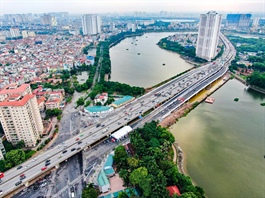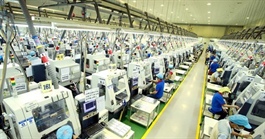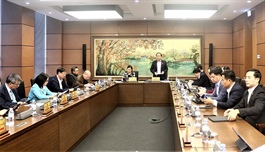European investors eye greener incentives
European investors eye greener incentives
European enterprises are focusing more and more on green investments to tap into fresh opportunities from Vietnam’s actions to achieve net zero by 2050, but they need legal improvements and incentives to facilitate their plans.
To venture further into fresh opportunities, the European Chamber of Commerce in Vietnam (EuroCham), which represents more than 1,200 businesses having strong expertise in green growth, is to host a 3-day conference and exhibition on November 28-30 in Ho Chi Minh City to create a platform to discuss, find, and apply European green solutions, technologies, and services in Vietnam.
The Green Economy Forum and Exhibition event will facilitate sustainable development by transferring technologies, funds, and knowledge from European to Vietnamese businesses. This move strongly reflects and reinforces the trend in EU investment in Vietnam and EuroCham’s vision for sustainable development.
Earlier this month, a group of businesses from Styria, the fourth-most populous state of Austria, visited Vietnam to seek investment opportunities in in green growth.
Regional Minister for Foreign Affairs Barbara Eibinger-Miedl who led the Austrian delegation said that there are ample opportunities for Austrian firms to invest in Vietnam in energy technology and environment, design and construction, as well as green technologies.
Several Austrian firms are doing well in Vietnam, namely equipment manufacturer Andritz, power train system developer EVL List, and steelmaker Voestalpine.
For instance, for over 15 years, Andritz had been serving the rapidly growing market through a representative office in Hanoi until early 2016, when a full legal entity was established. Andritz is committed to the sustainable development of Vietnam’s hydropower and water resources management sectors, and has signed a number of contracts for hydropower projects in Vietnam such as the for the Pac Ma project in Lai Chau province; one for the Thuong Kontum venture in Kon Tum and Binh Dinh provinces; the Nhan Hac project in Nghe An province; and the Hoa Binh project in the province of the same name.
Austrian firms are among those from the EU growing green business and investment activities in Vietnam because the Southeast Asian nation is taking actions to implement the COP26 commitments to achieve net-zero greenhouse gas (GHG) emissions by 2050.
Like Austria, Denmark and Norway have been making similar moves. In May, Equinor, Norway’s largest energy company, opened its Hanoi office in anticipation of promising chances from energy transition here.
Denmark’s Lego has also announced a $1 billion high-quality green investment in the southern province of Binh Duong. The company aims to build its first carbon-neutral factory, which is expected to generate 4,000 jobs and produce all its energy on-site.
Alain Cany, chairman of EuroCham, told VIR, “You can see many kinds of companies taking initiatives, small or large, for going green. We have seen many cases where Vietnam’s European companies, such as Sanofi and Heineken, move towards zero carbon goals. This strategy of attracting and retaining high-quality, sustainable foreign direct investment with the end goal of a green transformation appeals to European firms looking to invest in Vietnam and conscious consumers seeking products that align with their values.”
Several high-profile European-invested projects in the country have adopted sustainable European values to meet local demand and to benefit from Vietnam’s National Green Growth Strategy, with energy, smart manufacturing, environment, and green infrastructure among the most attractive trends.
In late 2021, Vietnam approved the strategy for 2021-2030, which targets to reduce GHG emission intensity per GDP by at least 15 per cent by 2030 and at least 30 per cent by 2050, promoting sustainable consumption based on the principles of equality, inclusivity and raising resilience, as well as green development in economic sectors and industries.
To this effect, the country will focus on efficiently using natural and energy resources with advanced science and technology as the foundation, applying digital technologies and digital transformation, developing sustainable infrastructure to raise the quality of growth, bringing competitive advantages and reducing the negative impact on the environment. The government is likely to release further decrees on implementation, including investment incentives for foreign businesses.
While identifying green growth as a key factor in attracting foreign investment to Vietnam, according to the Business Climate Index (BCI) for the third quarter of 2022 released last week by EuroCham, the number of respondents who rated Vietnam’s green potential positively decreased from 44 to 32 per cent.
Global economic conditions remain unstable due to the escalating conflict in Ukraine, persistent inflationary pressures, a labour shortage worldwide, and stagnant global growth are taking their toll on the optimism amongst European business leaders in Vietnam. According to the BCI, European business stakeholders’ perception of Vietnam’s business and investment climate dropped 6.4 index points to 62.2.
Participants in the BCI recommended that Vietnam improve its legal framework (92 per cent), its infrastructure (87 per cent), and its investment incentives (86 per cent) to accelerate green development. The BCI was produced by YouGov Decision Lab, involving over 1,200 members representing virtually every sector of Vietnam’s economy.
Thue Quist Thomasen, CEO of YouGov Decision Lab, said, “By curbing inflation, improving credit ratings and continuing GDP growth, Vietnam’s story stands out as less pessimistic globally as companies plan and look forward to 2023. Sentiment remains well above the midpoint of 50, indicating a positive outlook for the future.”


















